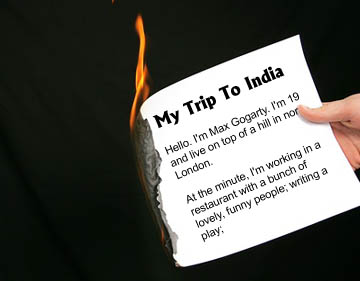BLOGS GRANT UNPARALLELED potential for spontaneity and interaction to writers everywhere – a virtual printing press, under your fingertips.
But with this new podium comes one of the less desirable traits of mass media: scrutiny from a faceless mob.

BLOGS GRANT UNPARALLELED potential for spontaneity and interaction to writers everywhere – a virtual printing press, under your fingertips.
But with this new podium comes one of the less desirable traits of mass media: scrutiny from a faceless mob.
With greater potential to bare your soul comes the greater danger of getting pecked to death by the peanut gallery.
Samuel Butler once said “…it is the duty of schools and colleges to abate (genius) by setting genius-traps in its way.”
If the sheltering structure of the academy is now decentralized, where are those genius traps hidden these days?
Kurt Vonnegut tells the story of a talented English student who wrote an exceptional short story that her professor compared to work by Chekhov and Mark Twain, two masters of the genre.
Is such lofty comparison a compliment – or a curse? Vonnegut has some harsh words for the professor:
“Thank you, you son-of-a-bitch, you’ve put this student in competition with one of the greatest writers who ever lived. And so the young lady will give up as being up against Chekhov, being up against Mark Twain, being up against me.”
Vonnegut’s story demonstrates the risk every artist invites when they create, not to mention the tremendous responsibility of a teacher-as-mentor.
Do we, as member-critics of the Internet, share a similar responsibility to nurture talent without criticizing too harshly or making unfair comparisons?
In Defense of Max
Consider a recent case, notable for how easily a worst-case scenario can come crashing down.
19-year-old Max Gogarty, son of travel writer Paul Gogarty, has just landed an opportunity most writers would sell their parents for: a feature travel column in the UK’s Guardian newspaper.
Whether Max got the gig through nepotism or hustle won’t matter if he can spark some interest. It’s sink-or-swim time – a lot of pressure to succeed.
The result: Max bombed. Hard.
The commentary took on a life of its own – admittedly funny, but relentlessly cruel. British derision is similar to being sealed in a pit of rabid chainsaws. It didn’t take the mob long to tear Max into little bloody pieces.
I didn’t relate to Max’s debut article, but my heart goes out to the poor guy. It’s one thing to be shouted down, quite another to be a young writer mercilessly skewered.
Thanks to the miracle of Internet, this kid has to get up in the morning and wonder where to start again. Most people don’t do that until they’re forty.
Quality Control?
Screenshot of Max’s blog post.
The quality of Max’s article itself is an issue separate from the pounding he got. If he meant to capture the naïve excitement of a kid on his first solo trip into Asia, he surely did that, if nothing else.
Would I read his blog? Maybe. I might enjoy reading as an amateur sheds his assumptive materialistic nonsense and wakes up to the world outside.
Would others read also? Possibly, if they’re looking for a fellow newbie with whom to connect. He’s just a kid. We’re not talking Vonnegut here.
If someone’s at fault, it’s not Max. Nor the British, whose surliness makes me happy to be American.
Blame rightly rests with the editors. Max shouldn’t have been put in that spot without preface as a novice traveler. It’s unfair to kick a beginner around.
Someone’s shortsightedness fed this kid to the lions, basically stacking a beginner next to Joyce. Publicly.
Whither Quality?
How, then, do we promote quality in writing? Credit where credit’s due.
Hemingway was a brilliant writer, well-traveled and multi-faceted. But I part ways with his glorification of war. I appreciate Jackson Pollack’s aesthetic, but admiration for his personal life would be a long time coming.
The list of faults could continue, until all the heroes are burned down and there is no true beauty left to appreciate.
The constant bickering in the blogosphere is no quest for quality – it’s a headhunt for failings. We’re all princes walking with porn stars, and at the end of the day there isn’t much difference between the two.
Despite foibles and illness, sometimes bloggers discover something brilliant to share. We should honor each contribution fairly, without nitpicking.
It’s been said criticism is a lesser form of intelligence; I think any intelligence used wantonly becomes its lesser.
Truth is a Brick
Truth is like a brick: it can be used to build or destroy, and the emphasis in “brutal honesty” tends to be on “brutal.” Tearing down is easier than building up, but thoughtless destruction becomes boring after a while, and leaves the landscape barren.
The artist’s heart is invisible to the medium – an essence we’re often blind to when we should be more aware. Each of us has experiences that are truly our own; learning to polish these ideas until they shine is what art (and life) is all about.
Vonnegut offered this advice:
“What I tell people is there is no trade anymore of writing, of storytelling, but you engage in it anyway…. It’s not a way to make a living. It’s a way to make your soul grow, to see who you are and where you are. I was in the Chemistry department and didn’t know my writing was crap. So I went on writing anyway because I enjoyed it so much.”
It doesn’t matter what he writes next. The gutsiest thing Max could do right now is to pick up his pen again, and box his own weight.
Questions to the Community:
Does anyone feel like they’ve been railed on unfairly for their writing? How did you handle it? What’s your advice for someone who’s taking heat? Do you believe we have the responsibility to moderate ourselves?